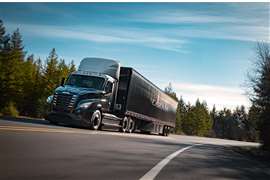Read this article in Français Deutsch Italiano Português Español
MIT study finds more investment needed for zero-emission trucks
19 November 2024
 Freightliner eCascadia - MIT paper found battery-electric to be most efficient (Photo: Freightliner)
Freightliner eCascadia - MIT paper found battery-electric to be most efficient (Photo: Freightliner)
A new study from the Massachusetts Institute of Technology (MIT) has confirmed what many in the transport industry have suspected; that while low- and zero-emission technologies in heavy-duty trucks are approaching maturity, they still have drawbacks which will prevent them from acting as a direct replacement for fossil diesel.
The study, which was presented at the recent (August 2024) American Society of Mechanical Engineers 2024 International Design Engineering Technical Conferences and Computers and Information in Engineering Conference in Washington DC, compared two ‘promising’ alternative drivetrain architectures which could possibly replace diesel fleets, which were lithium-ion batteries and hydrogen fuel cells.
“The whole issue [of decarbonizing trucking] is like a very big, messy pie. One of the things we can do, from an academic standpoint, is quantify some of those pieces of pie with modelling, based on information and experience we’ve learned from industry stakeholders,” said ZhiYi Liang, research student and lead author of the study.
According to details from the paper, ‘we developed a multi-dimensional techno-economic model to evaluate the technical constraints of onboard energy storage in HDVs [heavy-duty vehicles] and compare the operational techno-economics of zero-emission drivetrains against diesel vehicles’.
In summary, the paper found that while li-ion battery power ‘showed promise in decarbonizing HDVs’, particularly in cases where capacity was not a high priority, limited range of less than 500 miles was still an issue.
The study further found that in the case of long-haul freight in excess of 750 miles, H2 fuel cells are ‘a better candidate for replacing diesel heavy trucks than [li-ion] due to a higher cargo capacity’.
However, there would have to be considerable proactive investment and infrastructure development to establish a ‘mature hydrogen supply chain’, while suppliers would need to target a $2/kg price for hydrogen fuel.
Without this, the paper concluded: ‘the operational techno-economics and freight performance of the zero-emission options remain out-competed by existing diesel fleets’. In one possible route, it is put forward that a regulatory policy which limits the use of diesel vehicles could be necessary.
It’s perhaps disappointing that the paper omitted to include other fuel types, particularly HVO. While hydrotreated vegetable oil is carbon-neutral rather than a zero-emission solution, the prevalence of the fuel, increasing output across the United States and that it is a drop-in replacement for fossil diesel makes it a viable candidate for long-distance transport.
In an interview with Power Progress International (PPI) earlier this year, a representative of Neste, the world’s largest producer of HVO, noted that approximately 50% of the fuel in California’s diesel distribution network was now HVO.
Oliver Dixon, a regular correspondent for PPI, noted in a recent column that despite the availability of new technologies presented at this year’s IAA Transportation show in Hanover, Germany, there was still no clear route for on-highway transport to achieving reduced-emission targets.
That, too, might initially appear disappointing, but it’s still early days for this particular energy transition. There can still be no doubt that beyond technical supremacy, government legislation and cost/price fluctuations will have a considerable role to play in determining which of the new power solutions ultimately replace fossil diesel.
POWER SOURCING GUIDE
The trusted reference and buyer’s guide for 83 years
The original “desktop search engine,” guiding nearly 10,000 users in more than 90 countries it is the primary reference for specifications and details on all the components that go into engine systems.
Visit Now
STAY CONNECTED




Receive the information you need when you need it through our world-leading magazines, newsletters and daily briefings.
CONNECT WITH THE TEAM













